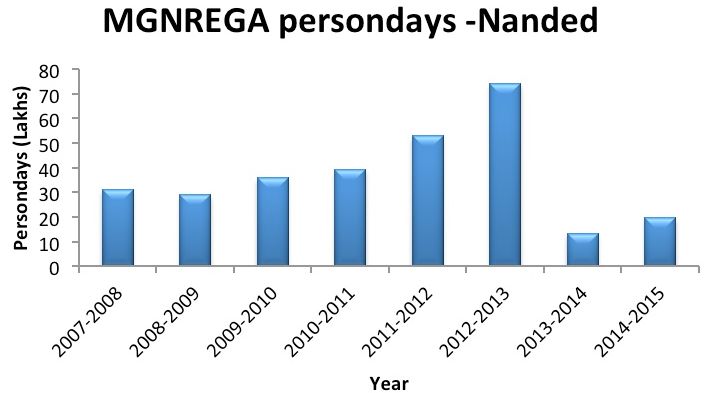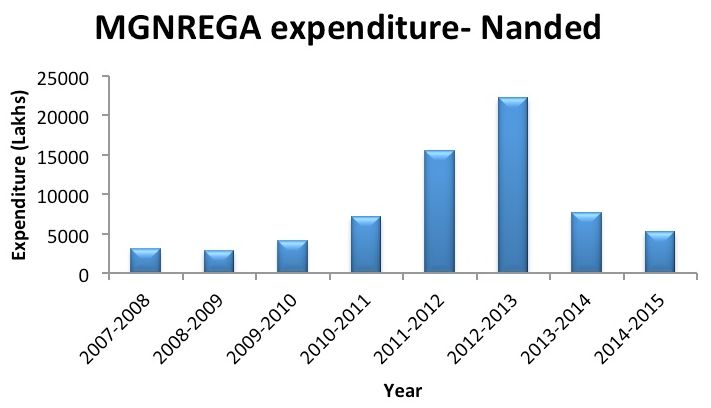Nanded district in Maharashtra demonstrated exemplary performance in MNREGA until
Nanded, one of the most backward districts in the state of Maharashtra, had demonstrated exemplary performance in the implementation of the Mahatma Gandhi National Rural Employment Guarantee Act (MNREGA) in the period 2010 to 2012. The district had also received an award from the Ministry of Rural Development for ‘Planning for Water Conservation’ for 2010-11. However, things took an ugly turn in 2012-13 when a corruption scam in the scheme was exposed. The incident shattered the district administration, and the implementation of the scheme has almost come to a virtual standstill.
Glory days and subsequent downfall
MNREGA assets had created tremendous impact in Nanded - a highly drought-prone district with an average annual rainfall of less than 1,000 mm. By 2011, the district, which has only 10% irrigated area, had around 10,181 completed MNREGA works related to water conservation and water harvesting. According to 2011 data, the groundwater level of the district had increased by 9 meters over a period of three years. The replacement of patchwork solutions like water tankers with more long-term solutions has also resulted in substantial savings. The expenditure on solutions to water scarcity came down from Rs. 21 crore (US$3.5 million approx.) per year to Rs. 1.4 crore (US$0.2 million approx.) in the year 2011. Unfortunately, now all these achievements have become mere reminiscences of the past.
No work has been initiated under MNREGA for the past two years in Pandurni, a Gram Panchayat in Mukhed block of the district, which had earlier grabbed national attention for the watershed-related projects it had undertaken under MNREGA. This year again, in spite of a drought in the region, the required impetus is lacking and villagers are forced to migrate to nearby cities in search of work.
Villagers in Nanded say
Now, without MNREGA, most of the watershed-related assets built under the scheme in Pandurni lie neglected with wild thickets and creepers growing on them. Had MNREGA been underway, work could have been undertaken for the maintenance of these assets.
There has been a steep fall in the expenditure and person-days generated under MNREGA in Nanded since the scam was exposed in 2012-13 (Figure 1).


Source: www.nrega.nic.in
No action is the safest option
The local authorities say that they are wary of dealing with MNREGA after the scam as many officials were put under enquiry: “We don’t deny the fact that there was corruption. But many innocent officials including Gram Rozgar Sevaks who knew nothing about it were detained. Nearly 23 cases were filed against various officials in
Authorities admit that there have been some flaws in the implementation of projects, which they mainly attribute to lack of manpower. “A large number of works was initiated under MNREGA. However, we did not have enough personnel to deal with such a voluminous amount of works. And with no electronic musters in place, it was impossible for us to verify the musters in detail”, says an officer against whom
According to some officials in the district administration, it has become impossible to resume MNREGA works in Nanded as the Gram Rozgar Sevaks – who
Contrary to the allegations posed by implementing agencies, Right to Information (RTI)2 activist Motiram Kale who played a key role in exposing the scam, shares a completely different story. According to him, the most rampant form of corruption happened through the deliberate creation of bogus workers by some corrupt officials: “I started noticing this when many people who have not worked under MNREGA started approaching me citing that they found their names in the musters. To probe further, I filed an RTI and accessed these musters. I was surprised to discover that a large proportion of funds have been
Cure should not be deadlier than the disease
To sum up, beneficiaries who are highly in need of MNREGA work are languishing amidst this mudslinging between implementing agencies and activists. It should be noted that Mukhed block alone has received 1,093 demand applications last summer (as told by an official from the block), which underscores the dire need for MNREGA work here. It is high time the district administration intervenes and
In general,
In such a case, the correct response would be to identify the guilty, reassure the rest, and block the hole through which the leakage became possible. But all care should be taken to ensure that the cure is not deadlier than the disease. The measure taken to assure the public that something is being done should not be such that the implementation of the scheme itself gets strangled. The scam mentioned above was committed almost four years ago and upon its discovery, a scheme desperately needed by the poor in the area has been brought to a standstill. This is despite the fact that subsequently there have been many systemic improvements. For example, most of the wage payments now go through banks rather than the post office. Besides, there is now a provision for providing a wage slip to each labourer for each wage payment; there
Notes:
- Sarpanch is the elected head of the Panchayat, a village-level statutory institution of self-government.
- Right to Information Act (RTI), 2005 mandates timely response to citizen requests for government information in India.




 28 January, 2016
28 January, 2016 






Comments will be held for moderation. Your contact information will not be made public.